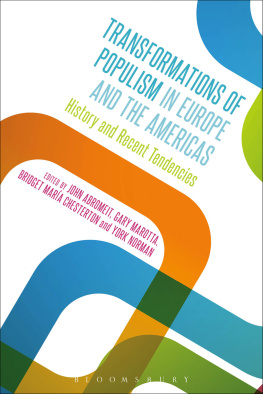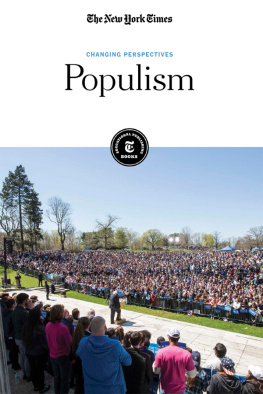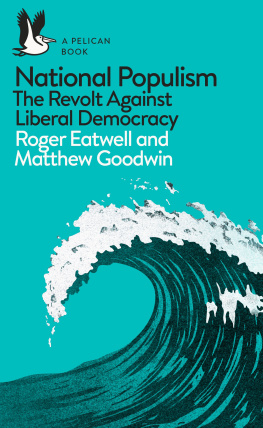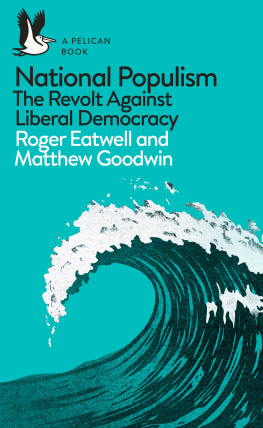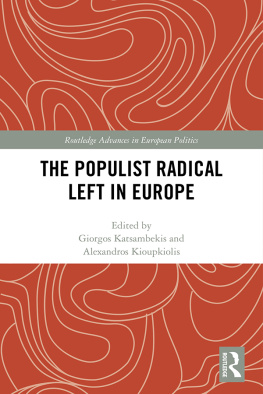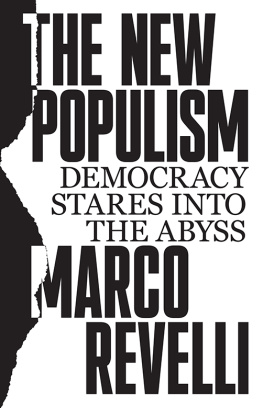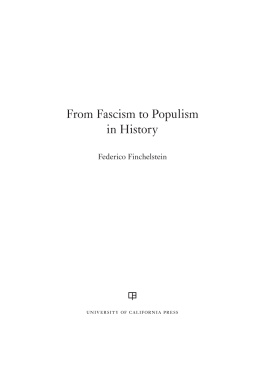
Contents
John Abromeit is an Associate Professor of History at the State University of New York, Buffalo State, where he teaches courses on modern German and French history, modern European intellectual history and historiography. He is the co-editor of Herbert Marcuse: A Critical Reader (with W. Mark Cobb, 2004) and Herbert Marcuse: Heideggerian Marxism (with Richard Wolin, 2005). He is the author of Max Horkheimer and the Foundations of Frankfurt School (2011). His articles and reviews have appeared in Constellations; Theory and Society; Theory, Culture and Society; Radical Philosophy; The Journal of Modern History; and The American Historical Review.
Mark Biondich is an Adjunct Research Professor at the Institute of European, Russian and Eurasian Studies at Carleton University in Ottawa, Canada. He teaches courses on the history of the modern Balkans and the post-communist transition in the region. He has authored two books, the most recent of which is The Balkans: Revolution, War, and Political Violence since 1878 (2011).
Peter Breiner is Associate Professor of Political Science at the University at Albany, State University of New York. He is the author of Max Weber and Democratic Politics (1996) and numerous articles on Weber, Karl Mannheim, and other political theorists who continued the project of connecting political theory to political sociology. He is presently at work on a book that seeks to demonstrate that modern democratic politics is defined not by settled institutions but by an ongoing and dynamic struggle over the meaning of political equality and citizenship.
Bridget Mara Chesterton is an Associate Professor of History at the State University of New York, Buffalo State. She earned her Ph.D. at SUNY Stony Brook in 2007. Her publications include The Grandchildren of Lpez: Frontier and Nation in Paraguay, 19041936 (2013) and articles in the Journal of Womens History and the Hispanic American Historical Review. She is the editor of a forthcoming text, also with Bloomsbury Academic, entitled The Chaco War: Environment, Ethnicity, and Nationalism. Her future work is a monograph-length text on the Stroessner years and consumption in Paraguay.
Carlos de la Torre is Professor of Sociology at the University of Kentucky. His most recent books on populism are The Promises and Perils of Populism (2014); Latin American Populism of the Twenty-First Century, co-edited with Cynthia J. Arnson (2013); and Populist Seduction in Latin America (2010).
Geoff Eley is the Karl Pohrt Distinguished University Professor of Contemporary History at the University of Michigan, Ann Arbor. His books include Reshaping the German Right: Radical Nationalism and Political Change after Bismarck (1980); The Peculiarities of German History (co-authored with David Blackbourn, 1984); Forging Democracy: The History of the Left in Europe, 18502000 (2002); A Crooked Line: From Cultural History to the History of Society (2005); Nazism as Fascism: Violence, Ideology, and the Ground of Consent in Germany (2013); and German Colonialism in a Global Age (co-edited with Bradley Narach, 2014). He is currently writing a general history of Europe in the twentieth century.
Ronald Formisano is the William T. Bryan Chair of American History and Professor of History (emeritus) at the University of Kentucky. He has written about populist movements and parties throughout his career. His seven books include The Transformation of Political Culture: Massachusetts Politics and Parties, 1780s1840s (1983); Boston Against Busing (1991, 2004, a study of reactionary populism); The Great Lobster War (1997); For the People: American Populist Movements from the Revolution to the 1850s (2008); and The Tea Party: A Brief History (2012). His study of inequality in the United States will appear in 2015.
Peter Fritzsche is Professor of History at the University of Illinois where he has taught since 1987. He is the author of several books including Rehearsals for Fascism: Populism and Political Mobilization in Weimar Germany (1990); Germans into Nazis (1998); Life and Death in the Third Reich (2008); and The Turbulent World of Franz Gll: An Ordinary Berliner Writes the Twentieth Century (2011).
Larry Eugene Jones is Professor of Modern European History at Canisius College in Buffalo, New York, and has published extensively on the political history of the Weimar Republic, including German Liberalism and the Dissolution of the Weimar Party System, 19181933 (1988). He is also author of Hitler versus Hindenburg: The 1932 Presidential Elections and the End of the Weimar Republic (2015) and editor of The German Right in the Weimar Republic: Studies in the History of German Conservatism, Nationalism, and Antisemitism (2014). He is currently working on a history of the German Right from 1918 to 1934.
Matthew B. Karush is Professor of History at George Mason University and Editor of the Journal of Social History. He is the author of Culture of Class: Radio and Cinema in the Making of a Divided Argentina, 19201946 (2012) and Workers or Citizens: Democracy and Identity in Rosario, Argentina, 19121930 (2002) as well as the co-editor of The New Cultural History of Peronism: Power and Identity in Mid-Twentieth Century Argentina (2010). He is currently completing a book on the transnational history of Argentine popular music.
Mark Loeffler is a Collegiate Assistant Professor and Harper-Schmidt Fellow in the Society of Fellows at the University of Chicago, where he also received his Ph.D. in History. He is currently revising his first book manuscript, Producers and Parasites: The Critique of Finance in Germany and Britain, which examines contestations of finance capital from the Great Depression of 18731896 through the aftermath of the interwar Depression. His second book project examines twentieth-century discourses on the technological displacement of labor.
Gillian McGillivray is an Associate Professor at York Universitys Glendon College History Department in Toronto, Canada. Her book, Blazing Cane: Sugar Communities, Class, and State Formation in Cuba, 18681958 (2009) was named a Choice Outstanding Academic Title. She recently published Cuba: Depression, Imperialism, and Revolution, 19201940, in The Great Depression in Latin America, ed. Paulo Drinot and Alan Knight (2014), and is working on a new research project on Sugar and Power in the Brazilian Countryside, 19281964.
Gary Marotta is Professor of History (Emeritus) at the State University of New York, Buffalo State. He received his MA from Columbia University, his Ph.D. from New York University, and has published in the fields of US intellectual and diplomatic history, as well as art history, including the exhibition catalogue for the Rodin retrospective at the New York Metropolitan Museum of Art. He served as editor of the Journal of Long Island History, and his senior administrative posts include University Dean at Long Island University, Vice President for Academic Affairs at the University of Louisiana-Lafayette, and Provost at Buffalo State College.
Cas Mudde is an Associate Professor in the School of Public and International Affairs at the University of Georgia. His most recent book publications include Political Extremism (2014), Youth and the Extreme Right (2014), and
Next page
